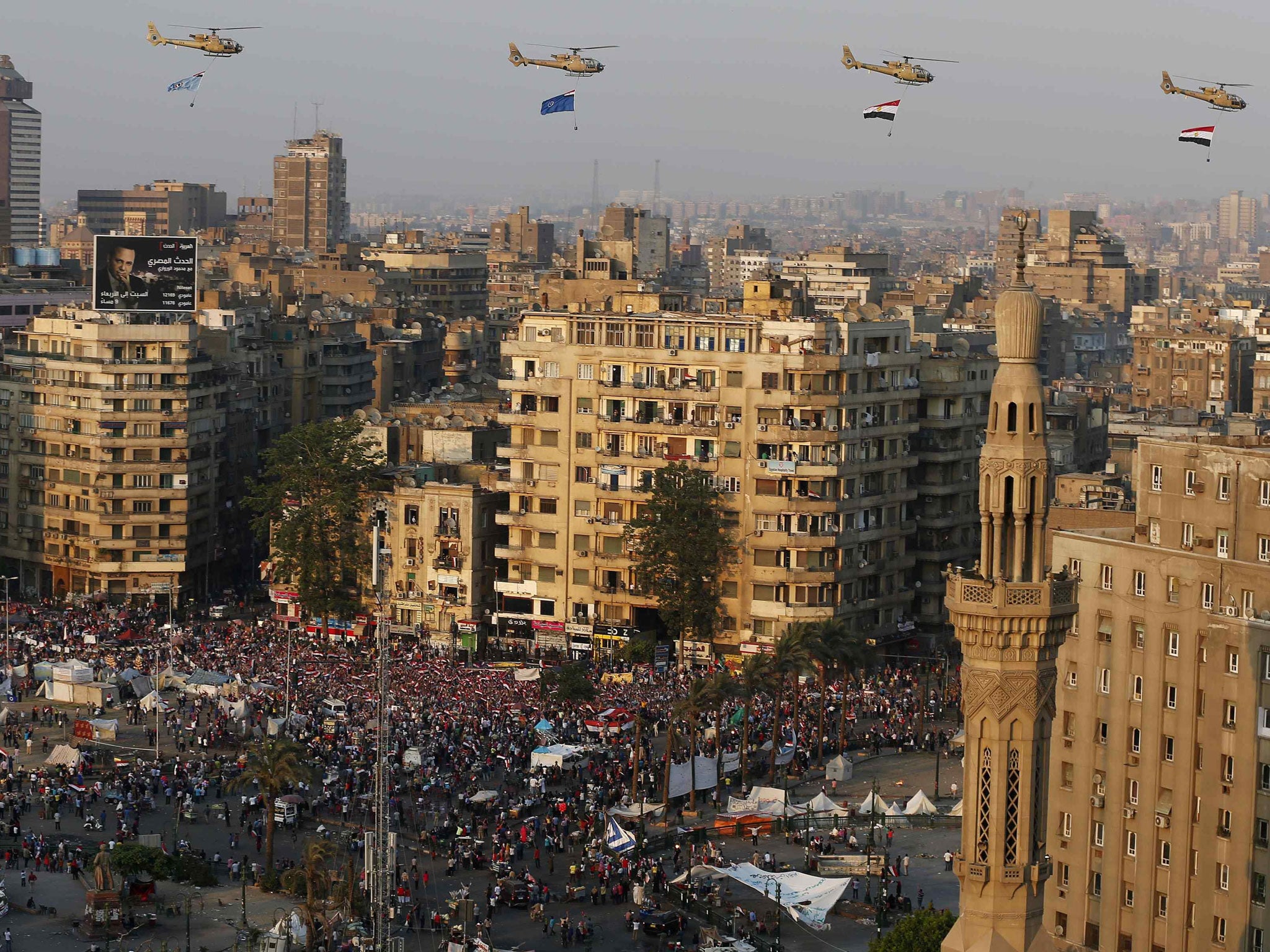View from Tahrir Square: 'Now we think we’ll have to fight again'
Fouaz was a witness to much of the Arab Spring. But the state of Egypt scares him most

Your support helps us to tell the story
From reproductive rights to climate change to Big Tech, The Independent is on the ground when the story is developing. Whether it's investigating the financials of Elon Musk's pro-Trump PAC or producing our latest documentary, 'The A Word', which shines a light on the American women fighting for reproductive rights, we know how important it is to parse out the facts from the messaging.
At such a critical moment in US history, we need reporters on the ground. Your donation allows us to keep sending journalists to speak to both sides of the story.
The Independent is trusted by Americans across the entire political spectrum. And unlike many other quality news outlets, we choose not to lock Americans out of our reporting and analysis with paywalls. We believe quality journalism should be available to everyone, paid for by those who can afford it.
Your support makes all the difference.“I used to come here every day the last time, sleeping two or three hours a night, fighting to get rid of the dictator. Here is my souvenir.” Fouaz Ahmed Bassam points to his cheek-bone, caved in courtesy of a swinging baton from one of Hosni Mubarak’s policemen two years ago.
“At the time it was worth it. We were so happy that everything was going to change for so much good,” recalls the 23-year-old student. “Now, now we think we shall have to fight again, but we do not know what is going to happen in the future. It will not be easy.”
A sea of banners and flags were once again swirling in the wind over Tahrir Square, the anger this time directed at Mohamed Morsi, the deposed president viewed by the thousands gathered as a fraud and a failure. The exultation at his departure, however, was tinged with apprehension. There are outbreaks of sudden and fierce violence, and no one is sure whether the Brotherhood will make good on its threat of armed resistance or whether the military, having once again tasted power, will give it up soon. “It is in the hands of the Egyptian people, but also the will of Allah,” Nadeem Wagha, a cousin of Farid, says with his hands spread.
A week before the first protests against Mubarak in 2011, Fouaz was in Tunisia as President Zine al-Abidine Ben Ali abandoned 40 years of power and fled into exile after just a week of rioting. I met him fleeing the tear gas in Avenue Bourghiba. Later, recovered, he spoke of his astonishment at what he was witnessing. No one of his generation in that part of the world had seen a strongman so entrenched fall.
We were not to know that this was the beginning of the Arab Spring which would sweep away Hosni Mubarak in Egypt, Muammar Gaddafi in Libya, Ali Abdullah Saleh in Yemen and ring reforms out of the kingdom of Bahrain before reaching its current bloody impasse in Bashar al-Assad’s Syria.
Fouaz and Nadeem were in Libya during the revolution, translating for Western journalists. They travelled to Jordan to help with organising humanitarian supplies for Syria and were shocked by what they saw. “It is barbaric, Arabs killing Arabs, bombing cities, shooting prisoners,” Fouaz says. But what affected them the most was the revolution unravelling back home. They and their friends have never supported the Muslim Brotherhood, but appreciate the organisation and focus it brought in the campaign against Mubarak’s regime.
“The Brotherhood said at first they weren’t going to stand for parliament, but then they did. They said they would not stand for the presidency, but they broke that promise. Then they tried to impose Sharia with this referendum. All the time Morsi did nothing about the economy collapsing,” says Nadeem, a 29-year-old graphic designer who has not had a steady job for three years.
It was the attempt to establish a theocratic state which brought the two men out on to the streets again. “If they had their way, we would go back 500 years. What would happen to our economy then? They say Saudi Arabia has strict laws, but they also have oil, we don’t.”
T he feeling in this corner of Tahrir is that the Islamists tried to hijack the Arab Spring and divided it by bringing in sectarianism.“In Syria it is Sunnis and Shias fighting each other when they should be fighting Assad,” shouts Abdulrahim Ali above the din. “Now people in Europe and America think our revolution was all about Islamists.”
But do they not have any empathy for Morsi? After all he is the first elected leader of the country and came from an ordinary background, not the moneyed elite or the military.
“No, because he betrayed the ordinary people. I agree it’s not just Morsi is to blame, I think he is led by the nose by Khairat al-Shater. But whoever is to blame most, we feel we must get back our revolution,” says Fouaz. The danger lies in the rhetoric turning into revenge.
While the army remained relatively neutral during the overthrow of Mubarak, the police carried out vicious attacks on protesters on his behalf. How does it feel to have them as allies this time? Touching his old wound, Fouaz shruggs. “Maybe they will not be allies forever, but, for the time being, they are not as dangerous for the revolution than Morsi and the Brothers.”
Join our commenting forum
Join thought-provoking conversations, follow other Independent readers and see their replies
Comments